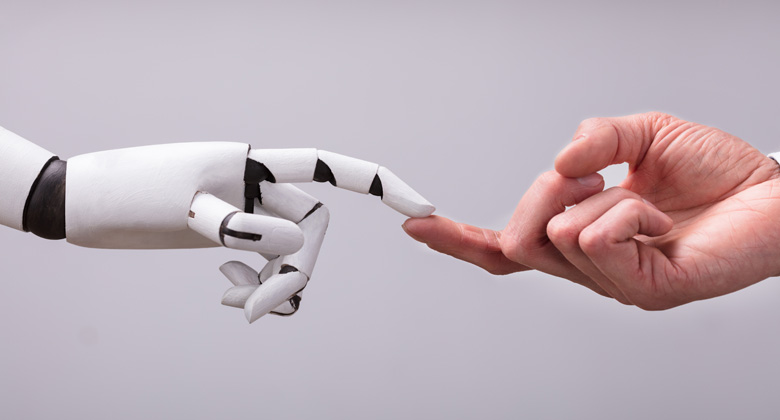The Future of AI in Business: Integrating AI into Product Design & Marketing
Did you know businesses leveraging AI can expect a revenue increase between 6 and 10%?
AI can bring a new level of insight and finesse to your strategies. This is especially the case in the world of product design and marketing.
However, it’s not as simple as pressing an “on” switch and making the most of AI. You need to use it thoughtfully, strategically, and effectively.
So, with that in mind, let’s explore the world of AI in product design & marketing in further detail.
Understanding the Role of AI in Product Design & Marketing
Let’s get the facts straight: AI is not about replacing the human touch! It’s about enhancing it.
AI can help you boost efficiency and creativity. It does this by automating and providing insights that allow humans to do what they do best: connect and innovate.
Product Design
AI isn’t just another tool in a designer’s kit – it’s like a new team member who brings a fresh perspective.
AI offers predictive analytics to anticipate market trends and consumer preferences, empowering designers to craft products that meet future needs, not just today’s desires.
Furthermore, AI can simulate countless design variations at speed. This helps designers iterate and refine their visions with unprecedented efficiency.
Marketing
When it comes to marketing, AI is incredibly versatile. It can analyse vast datasets to pinpoint what resonates with audiences and even predict the best channels and times to reach consumers.
Ultimately, AI means that you can capitalise on insightful data to create experiences that resonate with your target audience.
How AI is Being Used in Product Design & Marketing
Now, let’s dive into some real-world applications of AI for product design and marketing.
Companies are using AI to:
Analyse and Predict Trends
AI tools can sift through massive amounts of data to identify emerging trends, helping designers stay ahead of the curve.
Enhance User Experience
By understanding user behaviour, AI can guide product design improvements, creating more intuitive and user-friendly products.
Automate Routine Tasks
From generating design variations to scheduling social media posts, AI can handle repetitive tasks, freeing up human creativity for where it’s needed most.
Personalise Customer Interactions
AI’s ability to analyse individual customer data allows for highly personalised marketing messages, tailored to each customer’s preferences and history.
Optimise Marketing Strategies
AI algorithms can test different marketing approaches, analyse the results, and recommend the most effective strategies.
Integrating AI into Product Design
Imagine sitting at your desk, sketching out your latest product idea, and there’s AI, ready to pitch in. It’s like, “Hey, have you thought about this angle?” or “What about tweaking that feature for better customer engagement?”
AI isn’t just a tool; it’s a collaborative partner that enhances your creative process.
- Prototype perfection – AI can help you simulate and test prototypes virtually, saving time and resources.
- Tailored designs – With AI, you can create designs that adapt to individual user needs.
- Eco-friendly choices – AI can also suggest materials and processes that are kind to our planet. Designing sustainably? AI’s got your back.
Integrating AI into Product Marketing
Product marketing is all about creating conversations that resonate with your audience. With AI, those conversations are not just meaningful; they’re also incredibly personalised.
Making Every Message Matter
- Customer insights – AI helps you discover what your customers love, dislike, or desire.
- Dynamic campaigns – Ever wished you could tweak your campaign on the fly based on real-time feedback? With AI, you can.
- Effortless engagement – From social media to email, AI ensures your messages hit the mark every time. It’s like having a personal assistant who knows the ins and outs of your audience’s preferences.
By using AI for product design and marketing, you’re making every interaction count, every product shines a little brighter, and every marketing message strikes a chord.
The Benefit of Using AI in Product Design & Marketing
It’s All About Elevating Your Game
1. Speed
AI is like that fast-paced friend who gets things done yesterday. AI is all about efficiency, from speeding up research to automating design tasks.
2. Precision
AI’s data-driven insights help you precisely tailor your products and campaigns, ensuring you meet your audience’s needs spot on.
3. Innovation
With AI, the sky’s the limit. It pushes you to explore new frontiers in design and marketing, sparking ideas that might never have crossed your mind.
Optimising Design Processes with AI
Diving deeper into product design, let’s see how AI can help you turn the ordinary into the extraordinary.
Enhancing Product Design with AI-Powered Design Tools
- Smart prototyping – Imagine a world where you can test dozens of design variations in the time it used to take to test one. That’s AI for you, enabling rapid prototyping and instant feedback loops.
- User-centric designs – AI helps you get into your users’ shoes, understanding their preferences and behaviours like never before. It’s like having a direct line to your audience’s thoughts, ensuring your designs resonate on a personal level.
- Sustainability and efficiency – By suggesting eco-friendly materials and optimising production processes, AI not only boosts your green credentials but also saves you money in the process.
AI is not about replacing the human touch but amplifying it.
AI-Powered Marketing Strategies
AI for marketing and product innovation isn’t about bombarding your audience with messages; it’s about creating meaningful, engaging dialogues, where every interaction is a step towards a deeper connection.
Crafting Conversations That Resonate
- Predictive analytics – Imagine knowing what your customer wants before they do. AI’s predictive analytics can forecast consumer trends, helping you stay ahead of the curve and relevant.
- Automated personalisation – With AI, personalisation goes beyond just inserting a name in an email. It’s about crafting messages that speak directly to the individual, their interests, and their needs, making every communication feel like a one-on-one conversation.
- Real-time adaptation – AI’s ability to analyse data in real-time means your marketing strategies can adapt on the fly to changing circumstances or new insights, keeping your campaigns as dynamic and fluid as the market itself.
Challenges and Solutions in Integrating an AI Tool for Product Marketing & Design
While AI offers a world of possibilities, integrating it into product design and marketing comes with challenges.
Data Quality and Quantity
AI thrives on data, but what if your data is lacking? The key is to start building your data reservoir now, ensuring it’s clean and structured. Think of it as feeding your AI the right diet for optimal performance.
Ethical Considerations
With great power comes great responsibility. Using AI ethically, especially when it comes to customer data, is paramount. Transparent practices and respecting privacy are your guiding stars.
Keeping the Human Touch
AI in digital marketing and product design might be powerful, but it doesn’t replace human insight and creativity. It’s about using AI as a tool to enhance, not overshadow, the human element in your business.
Examples of Successful AI Integration in Product Design and Marketing
Now, let’s get inspired by the success stories of AI integration in product design and marketing.
1. Spotify Enhances Listening Experience with AI
Spotify transforms music listening into a deeply personal experience with its Discover Weekly feature.
Utilising AI, Spotify analyses each user’s listening history, combining it with the music trends and habits of similar profiles. Every Monday, users receive a playlist tailored just for them, filled with songs selected based on their unique preferences.
2. Amazon’s AI: A Dual Force in Voice Interaction and Shopping
Amazon leverages AI in two pivotal areas: voice interaction through Alexa and personalised shopping recommendations.
Alexa’s voice recognition allows users to interact with devices in a natural, intuitive way, from playing music to controlling smart home devices.
Simultaneously, Amazon’s recommendation algorithms use customers’ browsing and purchasing history to offer tailored product suggestions, enhancing the shopping experience by making it more personalised and efficient.
3. Tesla’s Drive Toward the Future with AI
Tesla is at the forefront of integrating AI into the automotive industry. Its vehicles use advanced machine learning algorithms to interpret vast amounts of data from onboard sensors and cameras, enabling real-time decision-making and improving autonomous driving features.
Summing Up: Recommendations for AI-Driven Business Success
As we stand on the brink of a new era in business, where AI’s role is not just influential but integral, it’s clear that embracing AI in product design and marketing isn’t just an option; it’s the pathway to the future.
Here’s how you can ensure your business isn’t just part of the AI revolution but at the forefront of it:
1. Start Small and Scale
You don’t have to overhaul your entire operation overnight. Begin with small, manageable AI integrations and scale as you witness the benefits and gain more confidence.
2. Foster a Culture of Learning
AI is evolving, and so should your team. Encourage ongoing education and exploration, turning your workforce into a dynamic, AI-savvy powerhouse.
3. Collaborate with AI, Not Just Use It
Think of AI as a team member. The more you integrate it into your processes, the more you’ll discover its potential to enhance creativity and efficiency.
4. Stay Agile and Adaptable
The AI landscape is shifting rapidly. Stay adaptable, keep abreast of new developments and be ready to pivot your strategies as needed.
If you’re looking for a full service creative digital agency that can help you leverage AI in a powerful and meaningful way, please do not hesitate to contact Appnova for more information!
Subscribe To Us
Contributors
Categories
Subscribe To Us
Contributors
Categories

This website uses cookies so that we can provide you with the best user experience possible. Cookie information is stored in your browser and performs functions such as recognising you when you return to our website and helping our team to understand which sections of the website you find most interesting and useful. Third party cookies such as Google Analytics is also used on this site to provide analytics in order to better understand the user engagement on our site.
You can adjust all of your cookie settings by navigating the tabs on the left hand side.
Strictly Necessary Cookie should be enabled at all times so that we can save your preferences for cookie settings.
If you disable this cookie, we will not be able to save your preferences. This means that every time you visit this website you will need to enable or disable cookies again.







0.Comments